

Gilles Lipovetsky. Un article de Wikipédia, l'encyclopédie libre.
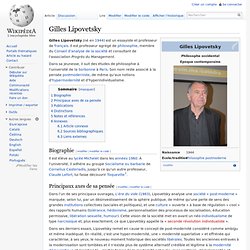
Gilles Lipovetsky Philosophe occidental Époque contemporaine Gilles Lipovetsky (né en 1944) est un essayiste et professeur de français. Il est professeur agrégé de philosophie, membre du Conseil d'analyse de la société et consultant de l'association Progrès du Management. Dans sa jeunesse, il suit des études de philosophie à l'université de la Sorbonne à Paris.
Biographie[modifier | modifier le code] Principaux axes de sa pensée[modifier | modifier le code] Dans ses derniers essais, Lipovetsky remet en cause le concept de post-modernité considéré comme ambigu et même inadéquat. La condition féminine participerait de plain-pied à cette révolution globale. LE CREPUSCULE DU DEVOIR. - L'éthique indolore.... Gilles Lipovetsky - Decitre - 9782070411870. Biographie de Gilles Lipovetsky Gilles Lipovetsky, né en 1944, est professeur de philosophie à Grenoble.
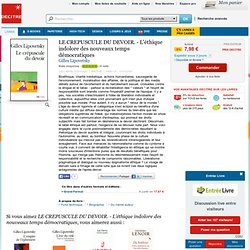
L'ère du vide est son premier ouvrage. Gilles Lipovetsky. Lipotevsky Gilles Lipovetsky (born September 24, 1944 in Millau) is a French philosopher, writer and sociologist, professor at the University of Grenoble.
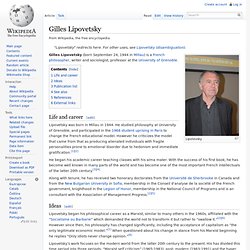
Life and career[edit] Lipovetsky was born in Millau in 1944. He studied philosophy at University of Grenoble, and participated in the 1968 student uprising in Paris to change the French educational model. However he criticizes the model that came from that as producing alienated individuals with fragile personalities prone to emotional disorder due to hedonism and immediate gratification.[1][2] He began his academic career teaching classes with his alma mater.
Jean-Baptiste Lamarck. Lamarck fought in the Pomeranian War with Prussia, and was awarded a commission for bravery on the battlefield.[2] At his post in Monaco, Lamarck became interested in natural history and resolved to study medicine.[3] He retired from the army after being injured in 1766, and returned to his medical studies.[3] Lamarck developed a particular interest in botany, and later, after he published a three-volume work Flore française, he gained membership of the French Academy of Sciences in 1779.
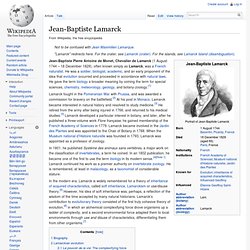
Lamarck became involved in the Jardin des Plantes and was appointed to the Chair of Botany in 1788. When the Muséum national d'Histoire naturelle was founded in 1793, Lamarck was appointed as a professor of zoology. Lamarckism. Lamarckism (or Lamarckian inheritance) is the idea that an organism can pass on characteristics that it acquired during its lifetime to its offspring (also known as heritability of acquired characteristics or soft inheritance).
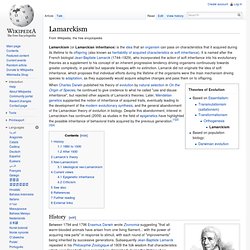
It is named after the French biologist Jean-Baptiste Lamarck (1744–1829), who incorporated the action of soft inheritance into his evolutionary theories as a supplement to his concept of an inherent progressive tendency driving organisms continuously towards greater complexity, in parallel but separate lineages with no extinction. Lamarck did not originate the idea of soft inheritance, which proposes that individual efforts during the lifetime of the organisms were the main mechanism driving species to adaptation, as they supposedly would acquire adaptive changes and pass them on to offspring. History[edit] 1880 to 1930[edit] After 1930[edit] Since 1988 certain scientists have produced work proposing that Lamarckism could apply to single celled organisms. Bertrand Russell. Russell led the British "revolt against idealism" in the early 20th century.[58] He is considered one of the founders of analytic philosophy along with his predecessor Gottlob Frege, colleague G.
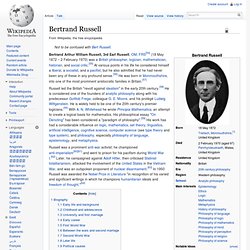
E. Moore, and his protégé Ludwig Wittgenstein. He is widely held to be one of the 20th century's premier logicians.[55] With A. N. Whitehead he wrote Principia Mathematica, an attempt to create a logical basis for mathematics. Russell was a prominent anti-war activist; he championed anti-imperialism[60][61] and went to prison for his pacifism during World War I.[62] Later, he campaigned against Adolf Hitler, then criticised Stalinist totalitarianism, attacked the involvement of the United States in the Vietnam War, and was an outspoken proponent of nuclear disarmament.[63] In 1950 Russell was awarded the Nobel Prize in Literature "in recognition of his varied and significant writings in which he champions humanitarian ideals and freedom of thought Biography Early life and background Early career.
Herbert Spencer. Herbert Spencer (27 April 1820 – 8 December 1903) was an English philosopher, biologist, anthropologist, sociologist, and prominent classical liberal political theorist of the Victorian era.
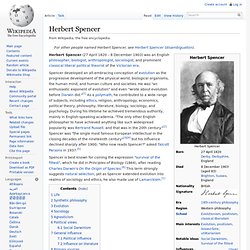
Spencer developed an all-embracing conception of evolution as the progressive development of the physical world, biological organisms, the human mind, and human culture and societies. He was "an enthusiastic exponent of evolution" and even "wrote about evolution before Darwin did. Auguste Comte. Un article de Wikipédia, l'encyclopédie libre.
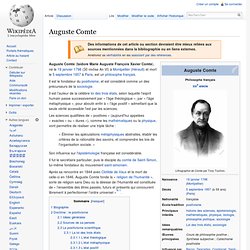
Auguste Comte Philosophe français XIXe siècle Lithographie de Comte par Tony Touillon. Jean-Jacques Rousseau. Un article de Wikipédia, l'encyclopédie libre.
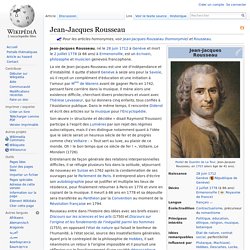
Jean-Jacques Rousseau, né le à Genève et mort le (à 66 ans) à Ermenonville, est un écrivain, philosophe et musicien genevois francophone. La vie de Jean-Jacques Rousseau est une vie d'indépendance et d'instabilité. Il quitte d'abord Genève à seize ans pour la Savoie, où il reçoit un complément d'éducation et une initiation à l'amour par Mme de Warens avant de gagner Paris en 1742, pensant faire carrière dans la musique.